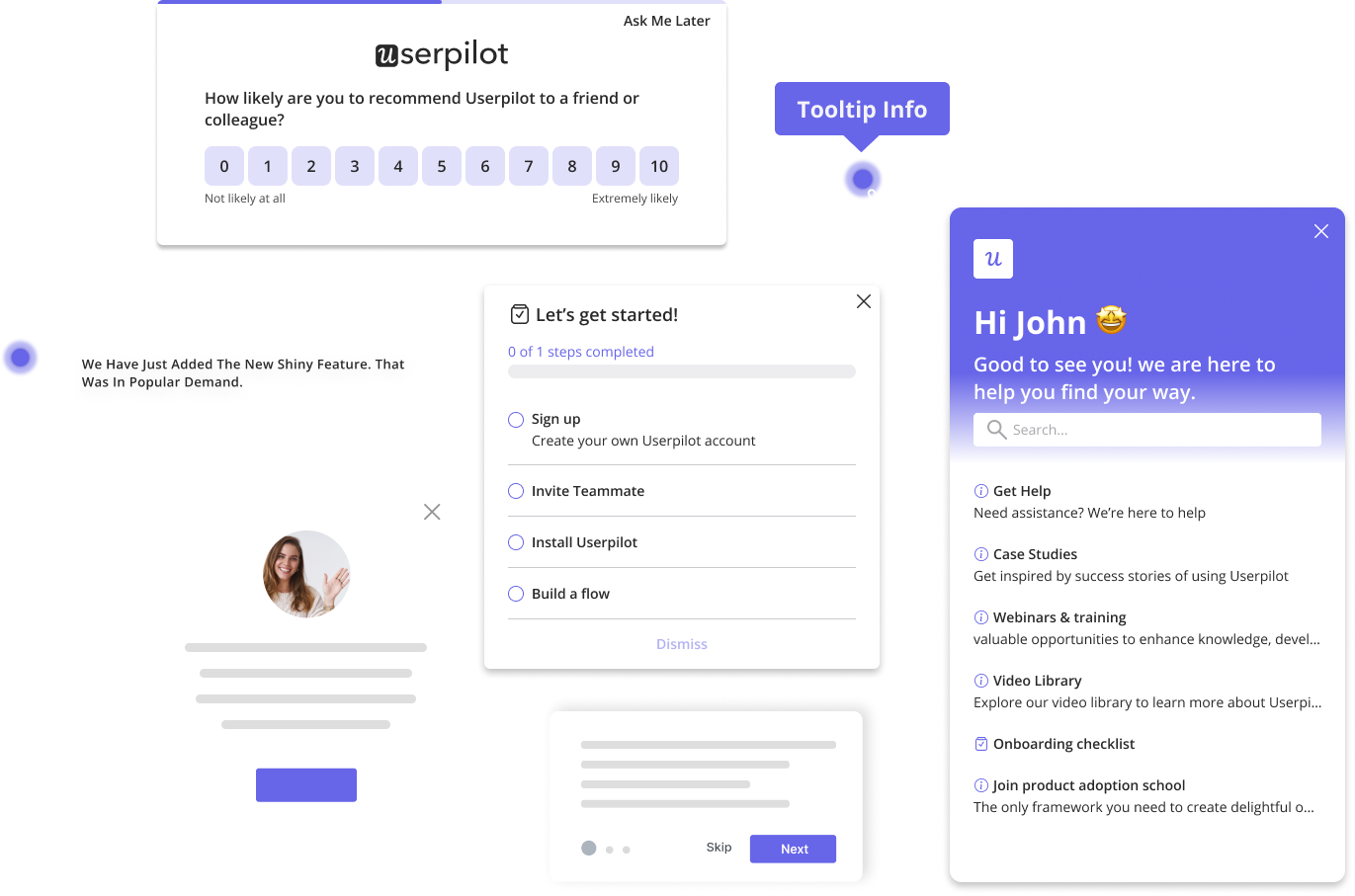
Forget the Hype: How Real Product Teams Win with AI (with Insights from Carlos Gonzalez de Villaumbrosia)
The AI era has fundamentally reshaped the landscape of product management.
Carlos Gonzalez de Villaumbrosia talked at the Product Drive Summit about how leading teams are navigating these changes. With practical insights and a dose of realism, he broke down the successes and pitfalls of AI adoption.
You can watch it right away here:
Or if you prefer reading, here comes the key takeaway!
Try Userpilot Now
See Why 1,000+ Teams Choose Userpilot

Who is Carlos Gonzalez de Villaumbrosia, anyway?
If you’re in the world of product management, you’ve likely heard of Carlos Gonzalez de Villaumbrosia. But who exactly is he, and why should his insights on AI and product teams matter to you?
Carlos is the visionary founder of the Product School, which has grown into a global leader in product management education, engaging over two million professionals worldwide. Think of him as your go-to coach for all things product, with a mission to elevate product managers from competent to world-class.
But Carlos’s influence extends beyond education. He authored The Product Book, hosts The Product Podcast, and organizes industry-defining events like ProductCon. Each year, he also leads the Proddys, awards that spotlight the most exceptional software products on the market.
With his extensive experience, Carlos offers more than just theory—he delivers actionable wisdom for navigating today’s AI-driven world.

Is adopting AI important for your business?
Short answer: Yes, it’s critical—and not just to keep up, but to get ahead.
AI isn’t a passing trend, it’s a seismic shift in how businesses operate. For context, McKinsey shows that 70% of digital transformations fail. Why? Because companies pay for strategic advice but miss the mark when it comes to real, ground-level execution.
Turns out AI has the power to change that, but only if approached strategically.
Carlos Gonzalez de Villaumbrosia emphasizes that product teams must view AI as a necessity rather than an option. Businesses that ignore AI risk being outpaced, while those that leverage it can drive efficiency, innovation, and competitive advantage.
However, adopting AI goes beyond throwing algorithms at problems. It requires a solid strategy, executive buy-in, and a relentless focus on implementation. The companies that are winning aren’t the ones that use AI as a flashy gimmick but those that harness it to solve real, business-impacting problems.
So, how can your product teams win in the AI era?
Winning with AI isn’t about gimmicks—it’s about strategic execution.
Carlos Gonzalez highlights that, in a world full of buzzwords, product teams must stay grounded and results-oriented. Here’s how:

#1 Ditch the old digital transformation playbook
The traditional approach to digital transformation (often led by strategy consultants) is outdated and ineffective. Many product teams have fallen into the trap of overusing buzzwords like “Agile”, “product-led”, and obviously AI without understanding their essence or how to implement them effectively.
According to Carlos, the problem isn’t a lack of ideas but a lack of executive approval.
Navigating digital transformation today requires following first principles, including:
- Craft a clear strategy: Successful transformations require full commitment from top leadership—especially the CEO—and a relentless focus on execution. Therefore, not pitching a compelling strategy won’t allow you to get buy-in from the C-suite.
- Make emphasis on people: Digital transformation isn’t just about the technology. Or as Carlos says, “buying a new fancy tool won’t drive new behaviors.”
- Make quick iterations: Transformation is not a one-off project. You need to do multiple iterations and show quick wins to your leadership so they can keep betting on you.
#2 Focus on revenue growth, not just user love
Listen, we all want users to adore our products. But let’s be honest, “user love” doesn’t pay the bills. As a product manager, your job isn’t just to create a product people like—it’s to build a product that makes money.
Carlos is spot on: Modern product teams need to be revenue generators, not just user advocates. Delivering value is the bare minimum. Now, you need to prove you can directly impact the company’s bottom line.
How do you do that? By teaming up with your go-to-market (GTM) squads:
- Marketing: Your product is a marketing powerhouse. Design it to attract and convert customers organically. Think free trials, freemium models, and viral features.
- Sales: Give your sales team the data they need to close deals faster. Track user behavior, identify high-value opportunities, and provide personalized product demos.
- Customer Success: Keep users coming back for more. Work with CSMs to identify at-risk customers and create retention strategies that drive recurring revenue.
#3 Let product teams have a seat at C-table
Forget the old image of product managers as order-takers. In today’s top companies, product leaders are sitting at the big kids’ table, calling the shots and driving strategy.
Don’t believe us? Over half of Fortune 100 companies now have a Chief Product Officer (CPO) in the C-suite. That’s a huge shift in power.
So, what does this mean for you? It means you’re not just a taskmaster anymore. You’re a player-coach—a leader who sets the vision and gets their hands dirty.
Now, product managers need to balance high-level vision with hands-on execution. This influence also comes with the responsibility to understand both the business and technology sides of the organization.
#4 Embrace AI as your helpful assistant
Let’s be real: AI isn’t going to steal your job as a product manager (at least not yet!). But it can make you seriously good at it. Think of AI as your super-powered sidekick, helping you do more, faster, and with less effort.
Need proof? Here are a few ways AI is already transforming product management, said Carlos:
- Automated session replays: Tools like LogRocket help you save time watching session replays by pointing out friction points.
- AI-powered user feedback: Platforms such as Productboard not only gather user feedback, but also generate summaries and even feature ideas for your product.
- AI-driven data analysis: AIs like Mixpanel allow non-technical users to ask what they need to know and get insights from an AI without having to manipulate data.
- Content creation for onboarding: Userpilot’s AI writing assistant creates engaging onboarding content, helping boost user adoption without manual effort.
But hold on! Before you go all-in on AI, there’s something you should know. A recent BCG study found that while AI can boost average performers, it doesn’t necessarily give the same edge to top performers. And while it can spark creativity, it might hurt your business problem-solving skills.

#5 Avoid running after AI features
Nowadays, many companies have fallen into the trap of building flashy AI features that don’t truly serve their users.
Instead of adding features that solve real problems and fit seamlessly into existing user workflows, these companies are just looking for another funding round from investors.
For example, companies like Logitech started adding AI functionality to devices that didn’t need it (which are their mouse devices, ironically, right?).
Even Apple, which waited for the hype to die down to incorporate AI, is yet pivoting quite quickly to keep up with the race.

The lesson here? Product teams should resist the temptation to chase AI buzzwords and focus on practical applications that enhance the user experience. As we explained, the best AI features are purpose-built and serve a clear user need—whether by automating repetitive tasks, assisting decision-making, or providing relevant insights.
Conclusion
Like it or not, AI is here to stay.
As a product leader, you don’t have much choice: If you want to set your company up for success, you need to embrace it. And do it quickly, before your competitors race off.
To learn more about how to lead a winning team in the age of AI, watch the replay of Carlos Gonzalez talk at the Product Drive Summit!











